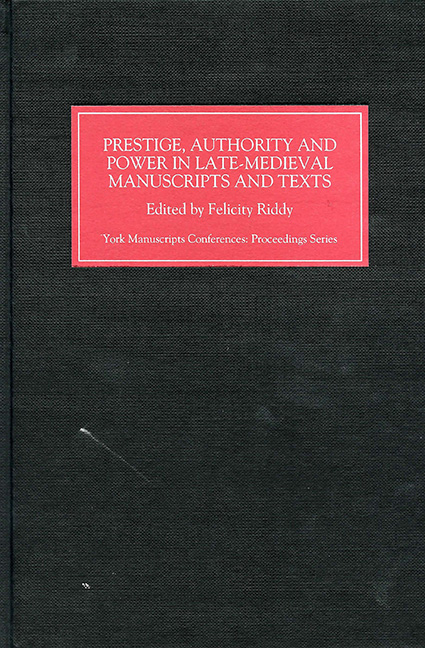Book contents
- Frontmatter
- Contents
- List of Plates
- Introduction
- Inventing Authority: Glossing, Literacy and the Classical Text
- Manuscripts of Nicholas Love's The Mirror of the Blessed Life of Jesus Christ and Wycliffite Notions of ‘Authority’
- The Patronage and Dating of Longleat House MS 24, a Prestige Copy of the Pupilla Oculi Illuminated by the Master of the Troilus Frontispiece
- Limner-Power: A Book Artist in England c. 1420
- A Poet's Contacts with the Great and the Good: Further Consideration of Thomas Hoccleve's Texts and Manuscripts
- The Politics of Book Ownership: The Hopton Family and Bodleian Library, Digby MS 185
- Piety, Politics and Persona: MS Harley MS 4012 and Anne Harling
- The Abbess of Malling's Gift Manuscript (1520)
- ‘Plutarch's’ Life of Agesilaus: A Recently Located New Year's Gift to Thomas Cromwell by Henry Parker, Lord Morley
- Manuscripts after Printing: Affinity, Dissent and Display in the Texts of Wyatt's Psalms
- Index of manuscripts
- Index of names and titles
- York Medieval Press: Publications
Piety, Politics and Persona: MS Harley MS 4012 and Anne Harling
Published online by Cambridge University Press: 24 October 2017
- Frontmatter
- Contents
- List of Plates
- Introduction
- Inventing Authority: Glossing, Literacy and the Classical Text
- Manuscripts of Nicholas Love's The Mirror of the Blessed Life of Jesus Christ and Wycliffite Notions of ‘Authority’
- The Patronage and Dating of Longleat House MS 24, a Prestige Copy of the Pupilla Oculi Illuminated by the Master of the Troilus Frontispiece
- Limner-Power: A Book Artist in England c. 1420
- A Poet's Contacts with the Great and the Good: Further Consideration of Thomas Hoccleve's Texts and Manuscripts
- The Politics of Book Ownership: The Hopton Family and Bodleian Library, Digby MS 185
- Piety, Politics and Persona: MS Harley MS 4012 and Anne Harling
- The Abbess of Malling's Gift Manuscript (1520)
- ‘Plutarch's’ Life of Agesilaus: A Recently Located New Year's Gift to Thomas Cromwell by Henry Parker, Lord Morley
- Manuscripts after Printing: Affinity, Dissent and Display in the Texts of Wyatt's Psalms
- Index of manuscripts
- Index of names and titles
- York Medieval Press: Publications
Summary
Objects tell us much about their owners. If individual inhabitants of medieval England seem impossibly remote, it is in part because they have left little of themselves behind for twentieth-century eyes and imaginations. Moreover, the meaning with which a particular object is invested may change over time to reflect different cultural practices and expectations, thus making the interpretation of its ownership fraught with difficulties. This paper examines a manuscript – London, British Library, Harley 4012 – owned by a fifteenth-century gentry woman from East Anglia, in an attempt to uncover various ways of interpreting manuscript ownership.
Harley 4012 is a collection of Middle English religious treatises, in both prose and verse. A full list of the contents is contained in the appendix. Although the book contains no illumination, it is nonetheless carefully presented, with red titles, blue and red paraphs, blue initials with red flourishing, and some initials in gold leaf with purple, blue and green foliage, that extend into the borders of the folios. It is, in fact, an extremely pretty, if unassuming, manuscript, and in both its physical appearance and its contents, it is representative of the religious books (i.e. not books of hours or psalters) in women's hands in the fifteenth century. On fol. 153r, partly visible to the eye but quite clear under ultraviolet light, is an inscription written in a fifteenth-century hand: ‘Thys ys the boke of dame anne wyngefeld of ha[r]lyng’ ([-r] is no longer visible).
Dame Anne Wingfield, née Harling, was born c. 1426, the daughter and heiress of Sir Robert Harling of East Harling, Norfolk, and his wife Jane Gonville, daughter and heiress of Edmund Gonville, and sole heiress of the Gonville family of Norfolk who had founded Gonville College, Cambridge.
In 1435, Sir Robert Harling was killed in battle in France, leaving Anne an heiress of considerable landed wealth; as the heiress of both the Harling and Gonville families, she owned at least fifteen manors and ten advowsons in Norfolk, as well as four manors and one advowson in Suffolk, and four manors in Cambridgeshire. Anne was a valuable enough commodity for there to be some dispute over the rights to her wardship, which was sold, by a rather circuitous route, to Sir John Fastolf in 1437.
- Type
- Chapter
- Information
- Publisher: Boydell & BrewerPrint publication year: 2000



